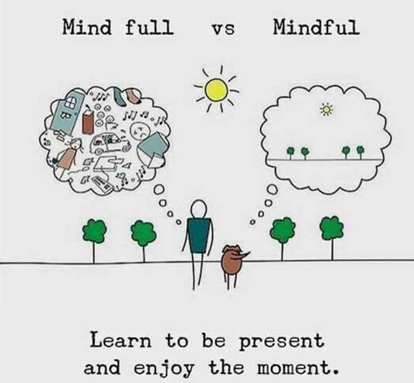
Mind Full vs Mindful: A Journey Towards Inner Peace

Mind Full vs Mindful: A Journey Towards Inner Peace

I came across this image on LinkedIn last week and it had such a significant impact on me. 2024 has given us a lot to 'fill our minds': thoughts, worries, to-do lists, and countless other fragments of information. This state of being ‘mind full’ can lead to stress, anxiety, and a lack of focus. On the other hand, being ‘mindful’ is a state of active, open attention to the present. It’s about observing your thoughts and feelings without judgment.
Being ‘Mind Full’
When we say our minds are full, it often means they’re cluttered with thoughts, problems, expectations, pessimism, and fear. It’s like a room filled with noise, where each sound is fighting for your attention. This state can be overwhelming and exhausting, leading to stress and burnout.
Being ‘mind full’ is like being in a constant state of multitasking, where you’re juggling multiple thoughts and tasks at once. The focus is on what 'should be done' or what is 'expected'; it is easy to lose focus and feel scattered in this state. You might find yourself forgetting things, making mistakes, or feeling like you’re always rushing but never really getting anything done.
The Practice of Being ‘Mindful’
Mindfulness, on the other hand, is about bringing your attention to the present moment. It’s about observing and being curious about your thoughts and feelings without judgment. It is about getting excited about what you are able to do in the moment, rather than focusing on what should be done. Try saying; I get to fetch my child from school and be grateful at the moment rather than thinking I have to fetch my child from school, and I have so much to do.
Practicing mindfulness can help you become more aware of your thoughts and feelings so you can manage them rather than being overwhelmed. It’s like turning down the volume in a noisy room so you can focus on one sound at a time.
Mindfulness can be practiced in many ways, including meditation, yoga, or simply focusing on your breath. It’s not about emptying your mind but about becoming an observer of your mind.
The Journey from ‘Mind Full’ to ‘Mindful’
Transitioning from being ‘mind full’ to being ‘mindful’ is a journey. It’s not something that happens overnight, but with practice, you can learn to become more present and less overwhelmed by your thoughts.
Start by setting aside a few minutes each day for mindfulness practice. This could be a formal meditation practice or a few moments of quiet reflection. Pay attention to your breath, the sensations in your body, or the sounds around you. When your mind wanders, gently bring your attention back to the present moment.
Remember, mindfulness is not about achieving a state of eternal calm or emptying your mind of thoughts. It’s about learning to observe your thoughts and feelings without judgment. It’s about recognising when your mind is full, and choosing to bring your attention back to the present moment.













































































